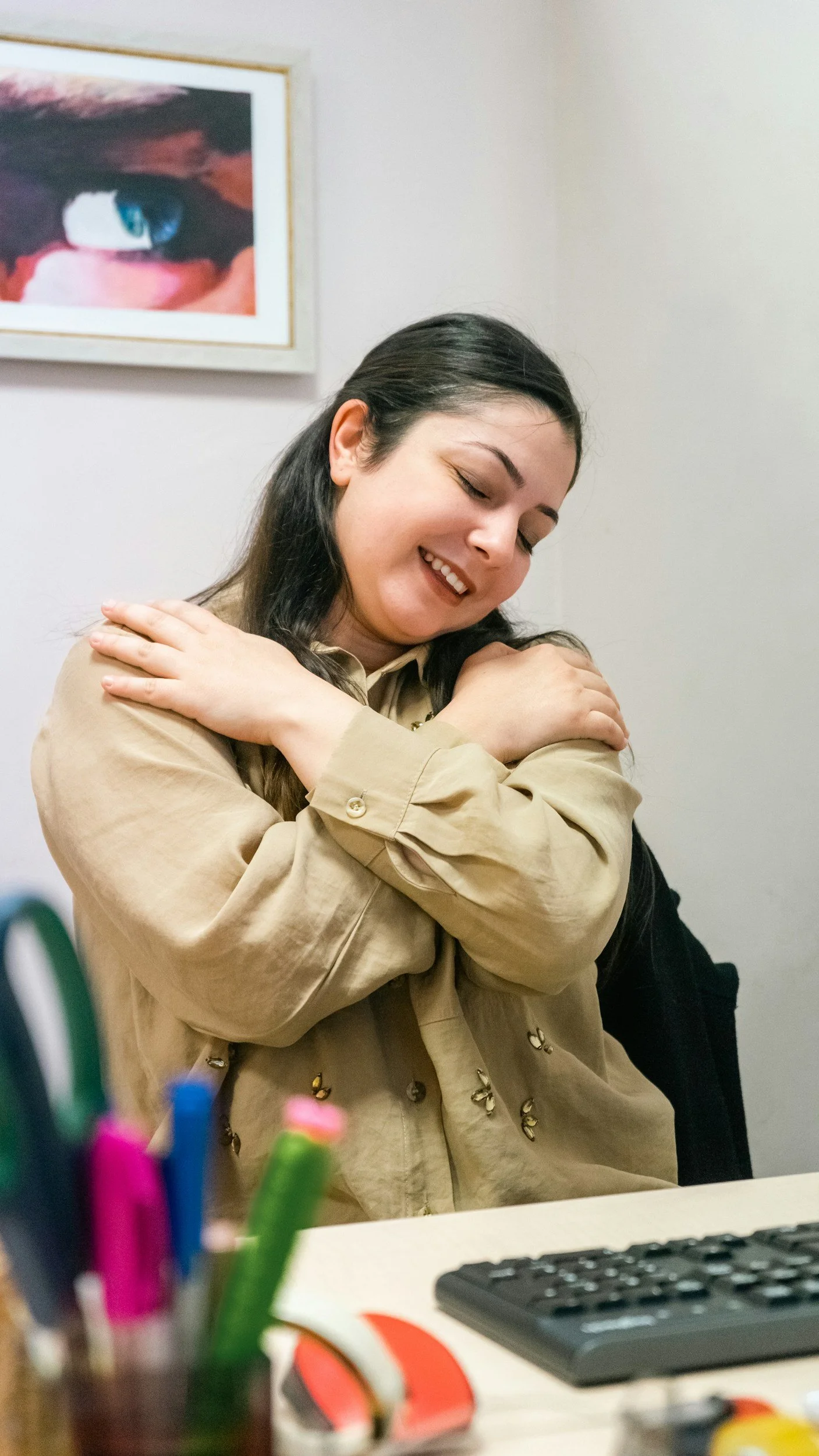Why Eating Disorders for Brown Girls Aren’t Always About Body Image
Let’s face it: if you’re a Brown woman or the daughter of immigrant parents, you’re probably not coming to therapy for help with an eating disorder. Instead, you’re coming to therapy because you want to reclaim your life. You want to have more control and autonomy over your own decisions, separate from what your family and culture tells you to do. As a licensed therapist who is also a Brown woman and the daughter of immigrant parents, I get it. For many Brown women, therapy isn’t about an eating disorder, disordered eating, or relationship to food and body, but it doesn’t mean that they’re not active themes in our lives.
Here's Why Brown Women Need EMDR Therapy
If you’re a Brown woman or a daughter of immigrant parents who has tried therapy before and walked away feeling unseen, misunderstood, or quietly discouraged, I so desperately want you to know that you’re not alone. As a licensed therapist, I’ve seen Western therapy keep you stuck in rumination, rather than help you process how you feel.
Western therapy often asks, “Why do you feel this way?” But trauma-informed and culturally responsive therapy asks, “What happened to you? What happened to your nervous system?”. EMDR therapy offers that difference without asking you to explain or justify your pain.
How Eldest Daughters Can Set Realistic Mental Health Goals for the New Year
The start of a new year is often framed as a fresh start, but for many eldest daughters, it can feel more like another evaluation. Another chance to “do better.” Another list of resolutions that quietly say, “You weren’t enough last year”. Growth doesn’t have to be dramatic or punishing to be real. For eldest daughters navigating perfectionism and burnout, meaningful change often looks slower, gentler, and far more sustainable than traditional resolutions allow.
Why EMDR Therapy Intensives Are the Best Investment You’ll Make This Year
High-achieving women of color are taught explicitly and implicitly to invest wisely. And yet, when it comes to investing in mental health, hesitation often shows up. For trauma survivors who are high-achieving women this hesitation is not a failure of commitment. It’s a learned survival response. For many women who are tired of staying stuck, EMDR therapy intensives offer one of the most high-impact ways to make that investment actually count.
How an EMDR Therapy Intensive Can Be the Foundation for Your Best Year Yet
For many Brown Americans and adult children of immigrants, this fear isn’t about laziness or lack of effort. It’s about history. Wanting real change doesn’t mean you’re doing something wrong. It means you’re noticing something important: motivation alone doesn’t create lasting transformation. This is where EMDR therapy intensives can offer something different. Not a quick fix. Not a productivity upgrade. But a grounded, intentional way to start the year from the inside out.
How Therapy Intensives Help You Reflect and Set Intentions for the New Year
For many women raised in South Asian families or immigrant households, this time of year can feel especially heavy. Productivity, sacrifice, and resilience are often modeled as survival tools—not reflection, rest, or emotional processing. So when the year ends and the noise quiets, emotions you’ve been holding back all year might finally come to the surface.
This is where therapy intensives can be uniquely powerful. Instead of rushing into another year on autopilot or forcing yourself to make resolutions from a place of burnout, therapy intensives offer intentional time and support to pause, reflect, and set intentions that actually align with your values, emotional needs, and nervous system.
How to Create Meaningful New Year’s Resolutions That Stick
If you’re South Asian American or part of an immigrant family, the transition into the New Year can bring a particular kind of weight. You might feel torn between wanting meaningful change and feeling deeply unsure about what you’re allowed to want. Maybe you’re exhausted from carrying responsibility for everyone else. Maybe you’re questioning South Asian cultural norms that taught you to prioritize duty over desire. Maybe you want change, but you don’t want to burn out again.
Here’s the truth that often gets lost in the New Year conversation: most people don’t fail at resolutions because they’re lazy or unmotivated. They fail because they’re trying to create unrealistic change without emotional support, without permission to slow down, and without space to unlearn
Your Immigrant Parents Aren’t Helpless Victims: What South Asian Americans Need to Know
For many South Asian Americans, there’s a quiet, persistent ache that comes with watching your immigrant parents struggle in a world they weren’t born into. You see their confusion at new systems, their exhaustion, their longing for familiarity—and you feel torn. And while there’s truth in their hardship, this narrative misses something vital: our parents are not helpless. They are incredibly resourceful people who survived what most of us can barely imagine.
For Brown Girls with Burnout: How Therapy Can Help You Recover
For many of us who were raised in immigrant communities, “rest” wasn’t a word that was acknowledged. Growing up, my parents told me that doing well in school was “average” or the “bare minimum”, and that I should strive to do more than what was expected of me. On the weekends, I was expected to not just study, but to also help out around the house, work a part-time job, and spending time with friends was looked down upon. From a young age, many of us are taught to excel — to be the “good girl” who studies hard, makes our parents proud, cares for others, and doesn’t make mistakes. Many South Asian women are quietly burning out in silence. It’s OK to admit that you’re exhausted.
How Therapy Actually Works: What South Asian Clients Need to Know Before Starting
If you grew up in a South Asian household, you probably learned early on that strength meant staying quiet. Maybe you were taught to push through discomfort, focus on gratitude, and not “make things a big deal.” Therapy, for many of us, wasn’t even part of the conversation—it felt unnecessary, indulgent, or maybe even shameful. But here’s the truth: therapy isn’t about being “broken.” And it’s definitely not about someone else swooping in to “fix” you. I’m not here to save you from yourself. YOU are the expert of your own life; I”m just a guide.
Why My Therapy Is Designed with South Asians in Mind
Choosing the right kind of therapy can feel overwhelming—especially when you’ve grown up balancing two worlds. You might find yourself explaining the weight of family expectations, the quiet sense of duty, or the guilt that follows when you set boundaries—and still feel unseen. This is therapy that meets you where you are.
5 Ways to Protect Your South Asian Mental Health During the Holidays
If you find yourself caught between wanting to honor your family and needing to protect your peace, you are not alone. Protecting your holiday mental health is not selfish—it’s a necessary step toward healing, balance, and authenticity.
Inside are five South Asian mental health tips to help you navigate the holidays with more ease and intention–from a licensed therapist who’s been there!
The Importance of Setting Boundaries in Relationships
Setting boundaries can feel like a challenge, but it’s a crucial step toward healthier, more respectful relationships. Learn why boundaries aren’t selfish and discover practical ways to protect your emotional well-being without causing resentment. This post provides a guide on how to set boundaries with family, friends, and partners to ensure you can show up in your relationships with clarity, confidence, and peace.
How to Deal with The Silent Treatment
Ever been on the receiving end of the silent treatment? It can be a confusing and painful experience, leaving you feeling isolated and unsure of what you did wrong. The truth is, this behavior is often less about you and more about the other person's emotions. In this post, we'll explore the reasons behind the silent treatment, from unspoken anger to a need for control, and how you can respond in a healthy, grounded way.
Drawing from my own experience with my parents, I'll share how their two weeks of silence after I announced my move to New York taught me a powerful lesson about staying true to myself. This is a must-read if you're looking to break free from guilt and stand confidently in your own decisions, especially within family relationships.
Do Indian People Have Perfectionism Anxiety?
Perfectionism anxiety is the anxiety that comes with having high standards for yourself, and it often involves the chase of unrealistic standards of being “good”, “successful”, or “on top of things”. It can be very subjective depending on what your idea of “perfect” is, and depending on different areas in your life, such as your career, education, body image, nutrition, family relationships, dating, money, etc. For many people who come from collectivist cultures with rigid moral hierarchies, “good” often means “perfect”. For many Indian people, there is an emphasis on being “good”, and that anything short of good can be “bad”.
For Brown Girls Who Have Complicated Relationships with Their Moms
Many South Asian moms expect their daughters to take advantage of the economic and educational opportunities that America has to offer, but to continue to observe socially conservative values about marriage and motherhood. They expect us to put up with what they put up with, plus do more. But it’s next to impossible to be #1 in both career and motherhood. Nevermind that dating is a full-time job on top of a full-time job. We’re supposed to “adjust” and make it work. But no one else is asked to adjust and make things easier for us.
Why Aren't Indian People Talking About Sudiksha Konanki?
As a South Asian therapist who works with trauma, I’ve had many clients bring up their disappointment in how their families responded to Konanki’s case. It can be hard to find safe people to open up to about these things. This further reinforces the shame and secrecy around trauma and traumatic events, and can lead to suffering in silence and shame. Let’s open up a discussion about the silence, secrecy, and shame that surrounds traumatic events in our communities.
Why is it hard for Indians and South Asians to find love?
Are you dating a person or a resumé? Do dates feel like job interviews? We have been conditioned to look for a resumé, a checklist, of surface-level traits that actually say nothing about the individual person’s character. When love and physical affection isn’t allowed or talked about, you don’t know how to love, you don’t know how to feel, and you don’t know how to develop a deeper connection. Where does what you want end, and what other people want for you begin?
Does Therapy Work for Indians and South Asians?
Currently, there’s a lot of discourse around the Westernization of therapy. Many therapists and therapy-seekers believe that therapy is too Western because it did not work for them. Does therapy, particularly in the Western sense, work for Indian and South Asian people?
You're Not Mean or Greedy for Setting a Boundary. Here's Why…
People say that setting boundaries isn't selfish; it's self-care. But I’d also argue that it’s precisely out of your care for others that you also have boundaries. When you don’t recognize and honor your limits, you’re going to hurt your relationships. So you owe it to yourself and to the people around you to have boundaries up.




















